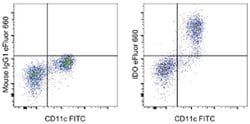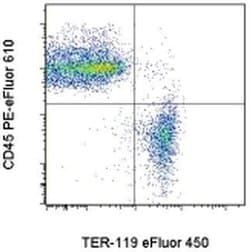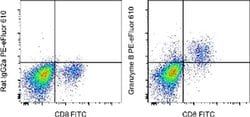50-112-8602
IDO Monoclonal Antibody (eyedio), eFluor™ 660, eBioscience™, Invitrogen™
Manufacturer: Fischer Scientific
Select a Size
| Pack Size | SKU | Availability | Price |
|---|---|---|---|
| Each of 1 | 50-112-8602-Each-of-1 | In Stock | ₹ 14,596.00 |
50-112-8602 - Each of 1
In Stock
Quantity
1
Base Price: ₹ 14,596.00
GST (18%): ₹ 2,627.28
Total Price: ₹ 17,223.28
Antigen
IDO
Classification
Monoclonal
Concentration
5 μL/Test
Formulation
PBS with 0.2% BSA and 0.09% sodium azide; pH 7.2
Gene Accession No.
P14902
Gene Symbols
Ido1
Purification Method
Affinity chromatography
Regulatory Status
RUO
Gene ID (Entrez)
3620
Content And Storage
4° C, store in dark, DO NOT FREEZE!
Form
Liquid
Applications
Flow Cytometry
Clone
eyedio
Conjugate
eFluor 660
Gene
Ido1
Gene Alias
EC 1.13.11.52; IDO; IDO1; IDO-1; INDO; indolamine 2,3 dioxygenase; indole 2,3-dioxygenase; indoleamine; indoleamine 2,3-dioxygenase 1; indoleamine 23-dioxygenase; Indoleamine-2; indoleamine-pyrrole 2,3 dioxygenase; indoleamine-pyrrole 2,3-dioxygenase
Host Species
Mouse
Quantity
25 Tests
Primary or Secondary
Primary
Target Species
Human
Product Type
Antibody
Isotype
IgG1 κ
Description
- Description: This eyedio monoclonal antibody reacts with human indoleamine-2,3-dioxygenase (IDO, INDO, IDO1), an intracellular enzyme that catalyzes the degradation of tryptophan to kynurenines
- IDO is expressed in a wide variety of tissues and cells, including macrophages, plasmacytoid dendritic cells, and several cell lines
- IDO can be induced in many different cell types by IFN gamma or other inflammatory stimuli
- Expression of IDO in antigen presenting cells and tumors is thought to mediate immune suppression through depletion of this essential amino acid and/or by the creation of tryptophan metabolites that cause apoptosis of T cells and induction of regulatory T cells
- Applications Reported: This eyedio antibody has been reported for use in intracellular staining followed by flow cytometric analysis
- Applications Tested: This eyedio antibody has been pre-titrated and tested by intracellular staining and flow cytometric analysis of stimulated normal human peripheral blood cells using the Intracellular Fixation & Permeabilization Buffer Set (cat
- 88-8824) and protocol
- Please refer to Best Protocols: Protocol A: Two step protocol for (cytoplasmic) intracellular proteins located under the Resources Tab online
- This antibody can be used at 5 μL (0.06 μg) per test
- A test is defined as the amount (μg) of antibody that will stain a cell sample in a final volume of 100 μL
- IDO1 is an intracellular heme-containing enzyme that catalyzes the oxidative cleavage of the indole ring of several important regulatory molecules like tryptophan, serotonin, and melatonin
- By doing this, IDO1 initiates the production of biologically active metabolites, commonly referred to as kynurenines
- IDO1 is widely expressed in a variety of human tissues as well as in macrophages and dendritic cells (DCs)
- In inflammation, interferons (IFNs) act on specific receptors to trigger IDO1 induction
- The production of IFN-gamma and induction of IDO1 represent important antimicrobial mechanisms
- Degradation and depletion of tryptophan by IDO1 inhibits the growth of viruses, bacteria and parasites
- Furthermore, IDO1 plays a complex and crucial role in immunoregulation during infection, pregnancy, autoimmunity, transplantation, and neoplasia.
Compare Similar Items
Show Difference
Antigen: IDO
Classification: Monoclonal
Concentration: 5 μL/Test
Formulation: PBS with 0.2% BSA and 0.09% sodium azide; pH 7.2
Gene Accession No.: P14902
Gene Symbols: Ido1
Purification Method: Affinity chromatography
Regulatory Status: RUO
Gene ID (Entrez): 3620
Content And Storage: 4° C, store in dark, DO NOT FREEZE!
Form: Liquid
Applications: Flow Cytometry
Clone: eyedio
Conjugate: eFluor 660
Gene: Ido1
Gene Alias: EC 1.13.11.52; IDO; IDO1; IDO-1; INDO; indolamine 2,3 dioxygenase; indole 2,3-dioxygenase; indoleamine; indoleamine 2,3-dioxygenase 1; indoleamine 23-dioxygenase; Indoleamine-2; indoleamine-pyrrole 2,3 dioxygenase; indoleamine-pyrrole 2,3-dioxygenase
Host Species: Mouse
Quantity: 25 Tests
Primary or Secondary: Primary
Target Species: Human
Product Type: Antibody
Isotype: IgG1 κ
Antigen:
IDO
Classification:
Monoclonal
Concentration:
5 μL/Test
Formulation:
PBS with 0.2% BSA and 0.09% sodium azide; pH 7.2
Gene Accession No.:
P14902
Gene Symbols:
Ido1
Purification Method:
Affinity chromatography
Regulatory Status:
RUO
Gene ID (Entrez):
3620
Content And Storage:
4° C, store in dark, DO NOT FREEZE!
Form:
Liquid
Applications:
Flow Cytometry
Clone:
eyedio
Conjugate:
eFluor 660
Gene:
Ido1
Gene Alias:
EC 1.13.11.52; IDO; IDO1; IDO-1; INDO; indolamine 2,3 dioxygenase; indole 2,3-dioxygenase; indoleamine; indoleamine 2,3-dioxygenase 1; indoleamine 23-dioxygenase; Indoleamine-2; indoleamine-pyrrole 2,3 dioxygenase; indoleamine-pyrrole 2,3-dioxygenase
Host Species:
Mouse
Quantity:
25 Tests
Primary or Secondary:
Primary
Target Species:
Human
Product Type:
Antibody
Isotype:
IgG1 κ
Antigen: CD45
Classification: Monoclonal
Concentration: 0.2 mg/mL
Formulation: PBS with 0.09% sodium azide; pH 7.2
Gene Accession No.: P06800
Gene Symbols: PTPRC
Purification Method: Affinity chromatography
Regulatory Status: RUO
Gene ID (Entrez): 19264
Content And Storage: 4° C, store in dark, DO NOT FREEZE!
Form: Liquid
Applications: Flow Cytometry
Clone: 30-F11
Conjugate: PE-eFluor 610
Gene: PTPRC
Gene Alias: B220; cd45; CD45 antigen; CD45 antigen isoform 1 precursor; CD45 antigen isoform 2 precursor; CD45 antigen isoform 3 precursor; CD45 antigen isoform 4 precursor; CD45 antigen isoform 5 precursor; CD45 antigen isoform 6 precursor; CD45R; GP180; Lca; L-CA; leucocyte common antigen; leukocyte common antigen; leukocyte common antigen A; leukocyte common antigen B; leukocyte common antigen, CD45; loc; LOW QUALITY PROTEIN: receptor-type tyrosine-protein phosphatase C; LY5; Ly-5; lymphocyte antigen 5; lymphocyte common antigen; Lyt-4; membrane tyrosine phosphatase; protein tyrosine phosphatase lambda; protein tyrosine phosphatase receptor type C; protein tyrosine phosphatase, receptor type C; protein tyrosine phosphatase, receptor type, C; protein tyrosine phosphatase, receptor type, c polypeptide; Protein tyrosine phosphatase, receptor-type, c polypeptide; protein tyrosine phosphatase; alternatively spliced; Ptprc; Receptor-type tyrosine-protein phosphatase C; RT7; T200; T200 glycoprotein; T200 leukocyte common antigen; T220 and B220
Host Species: Rat
Quantity: 100 μg
Primary or Secondary: Primary
Target Species: Mouse
Product Type: Antibody
Isotype: IgG2b κ
Antigen:
CD45
Classification:
Monoclonal
Concentration:
0.2 mg/mL
Formulation:
PBS with 0.09% sodium azide; pH 7.2
Gene Accession No.:
P06800
Gene Symbols:
PTPRC
Purification Method:
Affinity chromatography
Regulatory Status:
RUO
Gene ID (Entrez):
19264
Content And Storage:
4° C, store in dark, DO NOT FREEZE!
Form:
Liquid
Applications:
Flow Cytometry
Clone:
30-F11
Conjugate:
PE-eFluor 610
Gene:
PTPRC
Gene Alias:
B220; cd45; CD45 antigen; CD45 antigen isoform 1 precursor; CD45 antigen isoform 2 precursor; CD45 antigen isoform 3 precursor; CD45 antigen isoform 4 precursor; CD45 antigen isoform 5 precursor; CD45 antigen isoform 6 precursor; CD45R; GP180; Lca; L-CA; leucocyte common antigen; leukocyte common antigen; leukocyte common antigen A; leukocyte common antigen B; leukocyte common antigen, CD45; loc; LOW QUALITY PROTEIN: receptor-type tyrosine-protein phosphatase C; LY5; Ly-5; lymphocyte antigen 5; lymphocyte common antigen; Lyt-4; membrane tyrosine phosphatase; protein tyrosine phosphatase lambda; protein tyrosine phosphatase receptor type C; protein tyrosine phosphatase, receptor type C; protein tyrosine phosphatase, receptor type, C; protein tyrosine phosphatase, receptor type, c polypeptide; Protein tyrosine phosphatase, receptor-type, c polypeptide; protein tyrosine phosphatase; alternatively spliced; Ptprc; Receptor-type tyrosine-protein phosphatase C; RT7; T200; T200 glycoprotein; T200 leukocyte common antigen; T220 and B220
Host Species:
Rat
Quantity:
100 μg
Primary or Secondary:
Primary
Target Species:
Mouse
Product Type:
Antibody
Isotype:
IgG2b κ
Antigen: Granzyme B
Classification: Monoclonal
Concentration: 0.2 mg/mL
Formulation: PBS with 0.09% sodium azide; pH 7.2
Gene Accession No.: P04187
Gene Symbols: GZMB
Purification Method: Affinity chromatography
Regulatory Status: RUO
Gene ID (Entrez): 14939
Content And Storage: 4° C, store in dark, DO NOT FREEZE!
Form: Liquid
Applications: Flow Cytometry
Clone: NGZB
Conjugate: PE-eFluor 610
Gene: GZMB
Gene Alias: AI553453; C11; Cathepsin G-like 1; CCP1; CCP-1/C11; CCPI; CGL1; CGL-1; CSPB; CSP-B; Ctla1; Ctla-1; CTSGL1; cytotoxic cell protease 1; cytotoxic serine protease B; Cytotoxic T lymphocyte associated serine esterase 1; cytotoxic T-lymphocyte proteinase 2; cytotoxic T-lymphocyte-associated serine esterase 1; fragmentin; fragmentin 2; fragmentin-2; GLP I; GLP III; GLP-1; granzyme 2; granzyme B; granzyme B (granzyme 2, cytotoxic T-lymphocyte-associated serine esterase 1); granzyme B(G,H); Granzyme-2; GranzymeB; granzyme-like protein 1; granzyme-like protein I; GRB; GZB; Gzmb; HLP; human lymphocyte protein; Human lymphocyte protein (Hlp); Lymphocyte protease; Natural killer cell protease 1; OTTHUMP00000028189; RNKP-1; SECT; T-cell serine protease 1-3E
Host Species: Rat
Quantity: 100 μg
Primary or Secondary: Primary
Target Species: Mouse
Product Type: Antibody
Isotype: IgG2a κ
Antigen:
Granzyme B
Classification:
Monoclonal
Concentration:
0.2 mg/mL
Formulation:
PBS with 0.09% sodium azide; pH 7.2
Gene Accession No.:
P04187
Gene Symbols:
GZMB
Purification Method:
Affinity chromatography
Regulatory Status:
RUO
Gene ID (Entrez):
14939
Content And Storage:
4° C, store in dark, DO NOT FREEZE!
Form:
Liquid
Applications:
Flow Cytometry
Clone:
NGZB
Conjugate:
PE-eFluor 610
Gene:
GZMB
Gene Alias:
AI553453; C11; Cathepsin G-like 1; CCP1; CCP-1/C11; CCPI; CGL1; CGL-1; CSPB; CSP-B; Ctla1; Ctla-1; CTSGL1; cytotoxic cell protease 1; cytotoxic serine protease B; Cytotoxic T lymphocyte associated serine esterase 1; cytotoxic T-lymphocyte proteinase 2; cytotoxic T-lymphocyte-associated serine esterase 1; fragmentin; fragmentin 2; fragmentin-2; GLP I; GLP III; GLP-1; granzyme 2; granzyme B; granzyme B (granzyme 2, cytotoxic T-lymphocyte-associated serine esterase 1); granzyme B(G,H); Granzyme-2; GranzymeB; granzyme-like protein 1; granzyme-like protein I; GRB; GZB; Gzmb; HLP; human lymphocyte protein; Human lymphocyte protein (Hlp); Lymphocyte protease; Natural killer cell protease 1; OTTHUMP00000028189; RNKP-1; SECT; T-cell serine protease 1-3E
Host Species:
Rat
Quantity:
100 μg
Primary or Secondary:
Primary
Target Species:
Mouse
Product Type:
Antibody
Isotype:
IgG2a κ
Antigen: IL-10
Classification: Monoclonal
Concentration: 5 μL/Test
Formulation: PBS with 0.2% BSA and 0.09% sodium azide; pH 7.2
Gene Accession No.: P22301
Gene Symbols: IL10
Purification Method: Affinity chromatography
Regulatory Status: RUO
Gene ID (Entrez): 3586
Content And Storage: 4° C, store in dark, DO NOT FREEZE!
Form: Liquid
Applications: Flow Cytometry
Clone: JES3-9D7
Conjugate: eFluor 660
Gene: IL10
Gene Alias: CSIF; cytokine; Cytokine synthesis inhibitory factor; GVHDS; H-IL-10; il 10; IL10; IL-10; IL-10 precursor; IL10A; IL10X; ILN; Interleukin; interleukin 10; Interleukin10; interleukin-10; MGC126450; MGC126451; RP11-262N9.1; T-cell growth inhibitory factor; TGIF
Host Species: Rat
Quantity: 100 Tests
Primary or Secondary: Primary
Target Species: Human
Product Type: Antibody
Isotype: IgG1 κ
Antigen:
IL-10
Classification:
Monoclonal
Concentration:
5 μL/Test
Formulation:
PBS with 0.2% BSA and 0.09% sodium azide; pH 7.2
Gene Accession No.:
P22301
Gene Symbols:
IL10
Purification Method:
Affinity chromatography
Regulatory Status:
RUO
Gene ID (Entrez):
3586
Content And Storage:
4° C, store in dark, DO NOT FREEZE!
Form:
Liquid
Applications:
Flow Cytometry
Clone:
JES3-9D7
Conjugate:
eFluor 660
Gene:
IL10
Gene Alias:
CSIF; cytokine; Cytokine synthesis inhibitory factor; GVHDS; H-IL-10; il 10; IL10; IL-10; IL-10 precursor; IL10A; IL10X; ILN; Interleukin; interleukin 10; Interleukin10; interleukin-10; MGC126450; MGC126451; RP11-262N9.1; T-cell growth inhibitory factor; TGIF
Host Species:
Rat
Quantity:
100 Tests
Primary or Secondary:
Primary
Target Species:
Human
Product Type:
Antibody
Isotype:
IgG1 κ



